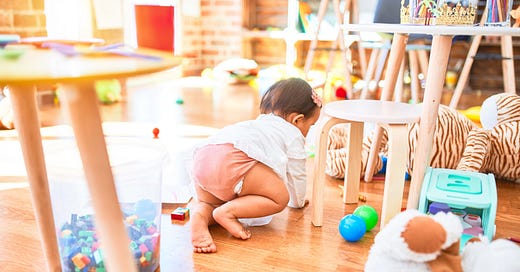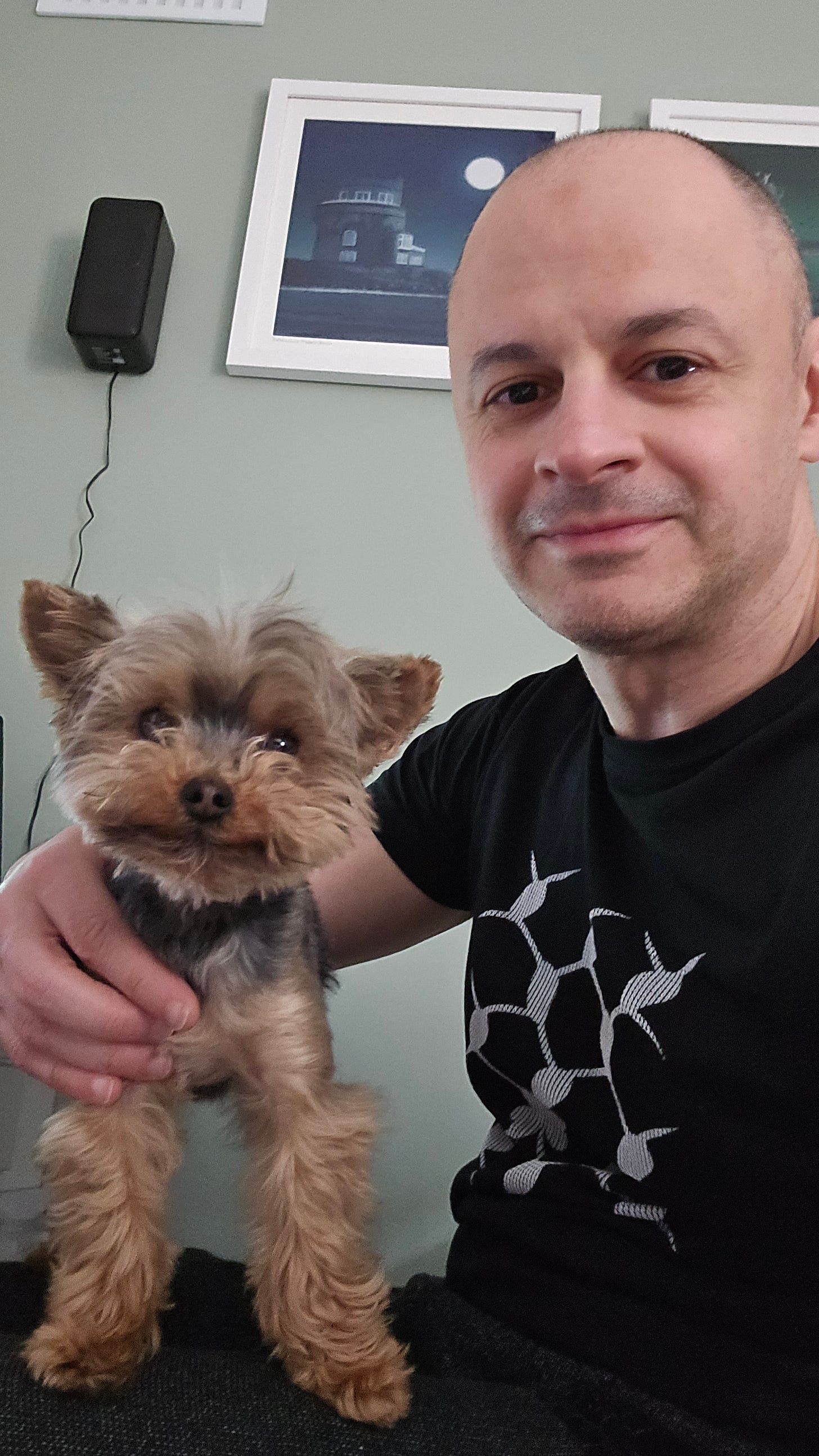Not Just Surviving but Thriving in Crèche
What the Research Really Says About Crèche in the Early Years
I remember standing in the kitchen, keys in one hand, a half-packed nappy bag in the other, and a head full of what-if scenarios. My wife and I are both doctors, which sounds impressive until you're staring down the barrel of returning to work with a baby who still smells like newborn. Our little girl was gurgling away in her bouncer, completely unaware that we were about to do something I swore I’d never do: leave her at a crèche. We were in Dublin. We had no choice. We needed to work. But logic didn’t do much for the tsunami of guilt. The moment we handed her over to a smiling stranger, I felt like I was betraying something sacred. I sat in the car afterwards convincing myself I’d done irreversible damage.
Fast forward three years. We were living in Toronto, and this time we had two kids. Our son was the baby now—just as clueless as his sister had been—and she, the seasoned crèche veteran, marched in like she owned the place. She gave him a reassuring pat on the back and said something like “You’ll be fine,” in the same tone she uses now to talk to the dog. He cried a bit. I nearly cried a lot. But again, by pickup time, he was paint-splattered, smiling, and neck-deep in toys I’d never seen before.
That’s when it clicked: crèche wasn’t a sentence. It was a second home. A community. A ridiculously colourful, chaotic space where my kids were thriving in ways I hadn’t anticipated.
I started reading everything I could get my hands on about what happens to children in daycare. The big question was, does it do more harm than good? I was desperate to prove to myself that I wasn’t messing them up. The deeper I dived into the research, the more I realized that most of the horror stories floating around on parenting forums have little basis in fact. Studies kept popping up with a simple, reassuring message: crèche attendance in the early years is generally linked to very positive outcomes, not negative ones. Kids learn social skills and language. They get comfortable with routines. They pick up on good habits like tidying up (I’m still waiting on that one) and sharing (with varying success). Long-term, they show improvements in school readiness and self-confidence. That alone made me exhale in relief.
A big bonus is the way children’s brains soak up new information like sponges in those early years. A decent crèche doesn’t just plop kids in front of a television. Caregivers engage them with songs, stories, art, and all those messy sensory play sessions that drive parents mad at home. This is the stuff that expands vocabulary and helps build those neural connections. My toddler started randomly busting out new words she’d picked up from her pals. Not only that, but she also learned French while she was at it! (all forgotten now). She even demanded certain songs at bedtime that I’d never heard before. There was a sense of pride watching her grow in ways I hadn’t orchestrated.
Then there’s the emotional side. I used to think leaving a baby at crèche would break the sacred parent-child bond. But all the data says secure attachment hinges on the quality of time you spend together, not just the quantity. If you’ve established a loving, responsive relationship at home, chances are your child’s attachment won’t be thrown out the window because they spend part of the day with a caregiver. The meltdown at drop-off is normal. Most children get through that stage quickly once they realize Mum or Dad always returns. Quality crèches also have staff who are trained to comfort children through these transitions, helping them build resilience in a gentle way.
What surprised me was how the social aspect kicked into gear. My little ones learned to negotiate with their peers. They learned that sometimes you have to wait your turn to get the shiny dinosaur toy. They discovered that people come in different shapes, sizes, and personalities. Sharing? Well, let’s say I witnessed more sharing in crèche than I ever managed to enforce at home. Over time, they got used to group activities and new experiences, so the first day of preschool wasn’t a total shock to the system. In fact, crèche turned out to be a fantastic prep course for the big wide world of “big school.”
A few parents have asked me, “But won’t kids get stressed out? I’ve heard they get anxious or aggressive in daycare.” Like anything, extremes matter. A tiny infant in crèche for 12 hours a day, five days a week, in a poorly staffed facility might experience stress. That’s a big reason Ireland has regulations that set limits and standards for adult-to-child ratios, cleanliness, and the overall atmosphere. When those guidelines are followed, the environment is more structured, and kids generally thrive. Actual studies across multiple countries back that up, showing no consistent link between daycare attendance and chronic anxiety or behavioural problems. In many cases, children from high-stress home environments find a bit of sanctuary at crèche if it’s a stable, caring place.
More research flips that anxiety argument on its head. Some kids come home calmer because they’ve been practicing emotional regulation among their peers. They learn that hair-pulling or toy-snatching leads to a stern chat from Miss Mary, and they start regulating themselves. They also see other kids dealing with similar frustrations, so they figure out they’re not alone in these big feelings. My kids discovered that tantrums at crèche often get overshadowed by the next crayon masterpiece, which puts a quick stop to the meltdown. Turns out you can’t wallow in meltdown mode for long if your best friend is beckoning you to join in the fingerpainting.
Long-term, the numbers are in daycare’s favour. Studies tracking kids into primary and even secondary school show that those who had quality early childcare often start formal education with better language skills and stronger self-regulation. A lot of that is down to having daily routines, exposure to group dynamics, and structured play activities in crèche. When you look at cognition and early academic markers, many children who attend crèche do equally well—if not better—than their home-cared counterparts. It’s not magic; it’s just consistent engagement and social learning.
We also can’t forget the sweet relief it can give parents. For many of us, work is not optional. Being confident that your child is in a safe, nurturing place frees you to focus on what you need to do. That reduction in parental stress has a positive knock-on effect for the home environment. I used to feel like a ball of tension leaving the house. Now, I know they’re in a place where someone will read them stories, feed them lunch without (too many) tears, and offer activities I never would have thought up on my own. So when I walk through that door after work, I’m more present for them than I would be if I spent the day worrying.
Quality is definitely key. High staff turnover, overcrowded rooms, and undertrained caregivers can lead to a less-than-ideal experience. Visiting and asking tough questions before signing up helps. Any reputable crèche will happily show you around, let you peek into the rooms, and talk about how they handle discipline and comfort children in distress. A place that invests in regular staff training and keeps the child-to-carer ratio reasonable is likely to be a safer bet than somewhere with a suspiciously low fee and no sense of order.
I’m not here to say crèche is mandatory or that every child must follow the exact same path. Some families thrive with one parent at home. Others lean on grandparents or childminders they trust like family. Each situation is unique. But it’s time we bury the myth that crèche is some anxiety factory for tiny humans. The evidence doesn’t support that idea. Quite the opposite. If it’s well-run, a crèche can be a place where babies and toddlers learn to navigate the world on their own little terms, building confidence and social smarts as they go. That first day might break your heart a little, but after you see those daily leaps in development—like singing a new song, or suddenly mastering a puzzle—it starts to make sense.
At the end of it all, you’re still the parent. Your love and presence matter above all else. Daycare can complement your parenting, but it won’t replace it. If the arrangement suits your family, don’t let guilt or outdated opinions hold you back. Give yourself a break and trust that you know your child best. Mine are older now, and they’ve moved on to other milestones, but they still talk about their crèche days like it was an epic holiday camp. That, to me, is proof enough. They found belonging and friendship. They learned a million little lessons I couldn’t have taught them alone. And if you’re in that place of deciding what to do, I hope this helps.
These days, my two kids barely look back when they head out the door. They’re confident, chatty, a little too independent for my liking sometimes—but they’re thriving. And while I still believe that we, their parents, are their anchor, I also know that their early crèche experiences helped shape who they are: curious, empathetic, socially switched-on little humans.
Which brings me to a new chapter I didn’t see coming. We got a miniature Yorkie named Buddy. He’s small, fluffy, and has the emotional depth of a 19th-century poet. And now, because life is chaotic and work never slows down, I’m facing something I never thought I’d have to do again—I’m putting him in doggy crèche. And guess what? The guilt is back. Full force. I'm the saddest. The kids? Delighted. They say things like “Buddy needs friends too, Dad,” while I sit there wondering if he’s emotionally prepared to be away from me for six hours.
So here I am, full circle, packing another bag—this time with chew toys and treats—and whispering reassurances to a dog who can’t understand me, but somehow knows exactly what’s going on. Turns out, letting go never really gets easier. But if there’s anything I’ve learned, it’s that they’re all a little more resilient than we think. And sometimes… it’s us who need to do the growing up.








I was in all the various iterations of childcare myself growing up and for the most part wished I was at home in all of them but knew my parents had to work and so it just was what it was.
I have no doubt that long term it does no harm, but I would have preferred to spend more of my childhood outside of a school/childcare setting and I’m trying hard to give that to my children now.
I do wish society made it easier for parents to be with babies for the first three years in some sort of flexible working capacity. Hopefully mine is not reflective of the experience for most children (it sounds like yours loved it), like anything in life, what works for one child won’t always for another.